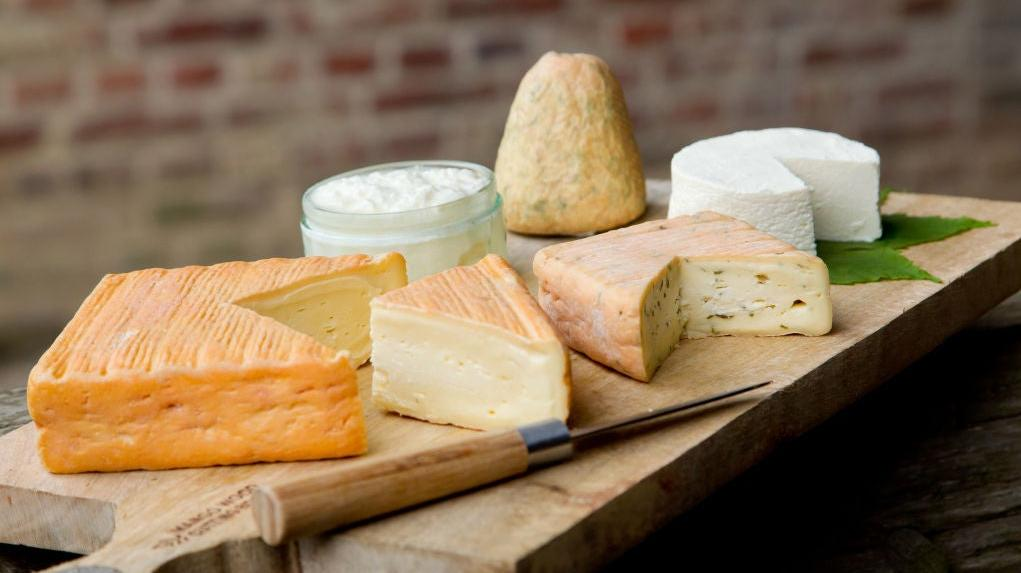An Ode To The Odors Of Pungent European Cheese
The first time I tried unpasteurized cheese was at home in New York. A friend visiting from Brussels smuggled a parchment-wrapped brick of Belgian cheese called Herve and an Alsatian Munster through JFK customs. She said she was surprised the crew had not reprimanded her for the odor penetrating from her overhead compartment. This friend, an American, always arrived home from Europe in effortless, elegant outfits, and the pungency of the cheeses she brought only added to her sophistication. She wore small gold jewelry and had even developed an authentically subtle continental accent. I envied her. From my vantage point, trapped at a desk job in midtown Manhattan where I worked in an over-air-conditioned cubicle under fluorescent light, mindlessly eating free but gross snacks like freeze-dried chickpeas coated in fake cheese powder, plastic tubes of nut butter, and mysterious blocks of compressed "superfoods," my sensual experience of the world as an American was limited, artificial, teetering on inhuman. I wanted to eat and smell more European.
My expat friend gave me the cheeses as a birthday present, and I served them at a party in my apartment. Few of my guests were fans. One said she could smell mildew and rot as soon as she entered the building vestibule. Another entered the apartment and asked who had "destroyed the bathroom."
We unwrapped the parchment to reveal the Herve, encased in a slimy orange coating. Then the Munster, which oozed a pale pink reminiscent of the juices that flow from undercooked chicken.
"Are you sure these are safe to eat?" I asked my expat friend.
"It looks correct," she replied. She insisted the smell was indicative of the quality. "I'd be wary if it didn't smell. Would you eat garlic that didn't smell like garlic?"
I could tell the other guests were not only repulsed but annoyed. They opened the windows. Someone had to leave to keep from gagging. A minority of us scraped tiny morsels onto crackers and chewed cautiously. The taste was mild compared to the stench, with a pleasant complexity similar to a cured meat. I guess you'd call it funk. I grew increasingly bold with my servings, taking more and more substantial slices and eating it with quince paste. I began to appreciate both the cheese and its aroma in the holistic way my friend suggested: the smell was an integral part of the experience. However, at this time I lived with a boyfriend who forbid me from bringing raw milk cheese into the apartment ever again. The next time my friend planned a trip home from Brussels, she offered to bring more contraband cheese. "Please, god, no," my boyfriend said.
Despite my refusal, my friend brought me one last cheese, a Morbier so pungent I wondered how it could share a name with the "Morbier" I had regularly encountered at the Coltrane-blasting "fine foods store" in my Brooklyn neighborhood. The Americanized Morbier I'd eaten before was a pasteurized import specially made for distribution in the US. I triple-wrapped this European Morbier in plastic and hid in the back of the fridge until my boyfriend and I broke up and he was no longer around to smell it.
Six months later, I moved to Brussels temporarily and sublet an apartment across the street from my friend's favorite cheese shop. I bought raw milk Camembert, Pont l'Eveque, and Maroilles. Alone in a new country, there was no one around to balk at the smell. But there was also no one around to help me eat all this cheese. I rarely finished it. I was homesick. Sometimes I would forget what was in the fridge and, suspecting that a mouse had died and decomposed somewhere in the apartment, go searching under the couch only to remember that the stench was the delicacy I had so long romanticized. Once I knew what it was cheese, I didn't mind it so much.
Later, back in the US, a Belgian-born friend who had moved to the States came for dinner. I apologized for the smell. "I'm very used to this," she said, "it smells like home."
When I think of America's smell, its defining feature is the absence of natural odor. I think of the artificial smells of a mall food court: synthetic butter, Subway sandwich "bread," candy-sweet cleaning products used to sanitize each bright interior. These smells are supernatural. I sometimes attribute this American fear of organic smells—an aversion to sensory experiences as overwhelming as the stench of decomposing milk—to American asceticism. A puritanical country would ban unpasteurized cheese, wouldn't they? The appeal of these rancid notes is almost erotic, like a lover's pheromones. I had once longed to be more like one of those European women who shirk deodorant and wear a fragrance of part natural body odors, part perfume. Ever the American, I continue to use lots of fabric softener and wear deodorant with aluminum. But whenever I want to recapture the wonder of living abroad, I indulge in the illicit pleasures of rank dairy.
